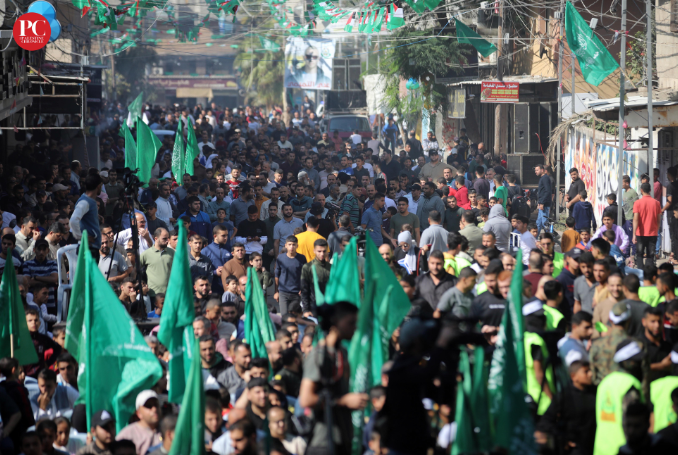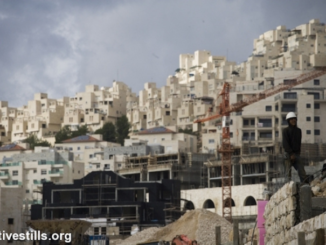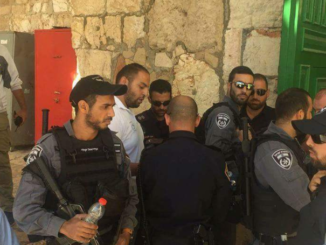
By Benay Blend
There is a small but problematic sentiment among some internationals that Palestinians in the Diaspora should play a minor role. Underlying this belief there is the notion that Diasporic Palestinians are allegedly not as well informed as those on the frontline in the homeland. Coincidentally, these activists often focus only on those that privilege non-violent resistance as the only path to peace.
Ironically, the same individuals who want exilic Palestinians to defer to their counterparts in the homeland are not doing so themselves, thus engaging in what Ramzy Baroud calls “teaching the oppressed how to fight oppression,” a glorification of non-violence that considers it the only path to peace.
These notions appear to mirror the Zionist entity’s efforts to divide the Palestinian population both spatially and politically, separating Gaza from the West Bank and ’48 Palestinians as well as the Diaspora from both. Moreover, checkpoints make it very difficult for travel within and between areas in the homeland, while political divisions—often instigated and encouraged by the Zionist state—often make collaboration between various factions quite difficult.
Ethnic cleansing since ’48 has created a scattered population which nevertheless has maintained close ties and loyalty to the homeland. Palestinians throughout the world continue to pass on traditional culture, attesting to the resilience of the people.
Speaking at a conference in London organized by the Palestine Return Centre, Alan Hart, former Middle East Chief Correspondent for Independent Television News, warns that “it’s time for the Palestinian diaspora to put its act together and become politically engaged. If it does not, there is a very real prospect that it will be charged with complicity by default in a final Zionist ethnic cleansing.”
Despite their displacement, writes Yoav Litman, Palestinians have acted with sumoud (steadfastness) that has become a hallmark of their struggle for return and liberation. “For over 69 years since the inception of Israel,” he continues, “the Palestinian identity has undergone systematic division and abuse. Its endurance is a testament to the inextricable nature of a collective ethos from the human psyche.”
Because Litvan believes that “members of the diaspora are indispensable to the collective struggle for Palestinian self-determination and against Israeli oppression,” he chose journalists/writers Ramzy Baroud and Rima Najjar to interview about their feelings on this subject. While Baroud declines identification as a member of any specific group, because he rejects their restrictive nature, he nevertheless explains that “refugees who never go home are scarred forever.” He knows this feeling from personal experience: “I have a home, but I cannot get to it, and no alternative home ever suffices. Believe me, I tried.”
For her part, Najjar exclaims, “I don’t know what it means to be Palestinian Jordanian, which is how I began my life, nor do I really understand what it means to be Palestinian American, which is my current status. But I know in my bones what it is to be Palestinian.”
Both contribute to the struggle through their writing, and both write from a place that is not-home, but nevertheless it is a space that is part of an international community of Palestinians, most of whom consider Palestine as their home.
“Exiles look at non-exiles with resentment,” claims Edward Said. “They belong in their surroundings, you feel, whereas an exile is always out of place. What is it like to be born in a place, to stay and live there, to know that you are of it, more or less forever” (Reflections on Exile and Other Essays, 2000, pp. 180-181)? Surely Doctors Baroud and Najjar would agree.
Speaking on behalf of the Palestinian Alternative Revolutionary Path Movement, Palestinian-Canadian writer Khaled Barakat contends that confronting the Zionist movement in the entity and beyond requires participation of the Palestinian people in exile and Diaspora. “The close connection between the role of the diaspora and the task of revolutionizing the international incubator of popular support” is, in fact, so distinct that for him it “requires no explanation.”
Barakat also speaks of the role played by armed resistance, exemplified in the recent March for Return and Liberation in Brussels. There thousands of people held images of the martyrs of the resistance and organizers of the prisoners’ movement, voicing chants for the Jenin Brigade, the Lion’s Den, and the Palestinian resistance.
Returning to the original point, that there is a faction of the solidarity movement that is prone to dictate to the oppressed which forms of resistance are acceptable and which are not. As Omar Zahzah notes,
“there is a problematic, obsessive iteration of ‘nonviolence’ within the broader Palestine solidarity movement that dehumanizes Palestinians, normalizes Zionism, and ultimately utilizes racist and colonial frameworks to advance the notion that the means of Palestinian resistance are more troubling than the reality of Zionist settler-colonialism.”
Because this agenda overlooks violence perpetrated by the Zionist state by shifting the focus onto Palestinian armed resistance, Zahzah questions the solidarity of these activists. “When the presence of a militarized, genocidal settler-colonial entity bothers individuals less than the means by which the colonized resist,” he claims, “it’s probably time to rethink one’s ‘solidarity.’”
In “The International Struggle on Behalf of Palestine,” Ilan Pappé, director of the European Centre for Palestine Studies at the University of Exeter, Britain, outlines his exit out of Zionism and its “comfort zone” into the more satisfying space of activist within the solidarity movement for Palestine (Our Vision for Liberation: Engaged Palestinian Leaders and Intellectuals Speak Out, Eds. Ramzy Baroud and Ilan Pappé, 2022, p. 411). Defining his own vision of what it means to be in solidarity, he writes, “Palestinians, themselves, will have to solve issues of unity and representation and chart for all of us their vision for the future and how they see the liberation project in our time” (p. 421).
His role as he sees it for himself and for others, too, is to ensure that the international movement remain supportive of the Palestinian struggle on the ground, until the day for victory comes, and he predicts “it will come, sooner or later” (Our Vision for Liberation, p. 421).

– Benay Blend earned her doctorate in American Studies from the University of New Mexico. Her scholarly works include Douglas Vakoch and Sam Mickey, Eds. (2017), “’Neither Homeland Nor Exile are Words’: ‘Situated Knowledge’ in the Works of Palestinian and Native American Writers”. She contributed this article to The Palestine Chronicle.







